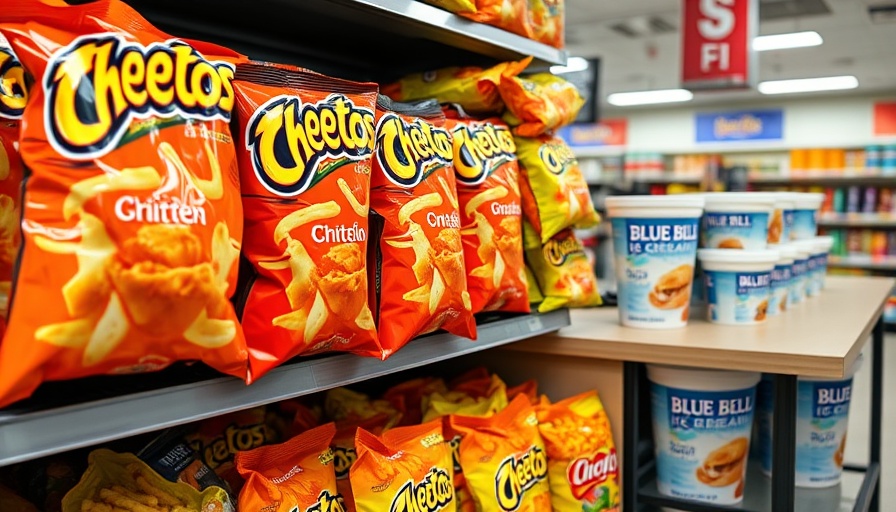
The Rise of Snack Food Labeling in Texas
In an unexpected turn for junk food aficionados, the Texas Legislature has recently approved Senate Bill 25, which mandates warning labels on a wide range of popular snack foods. If signed into law by Governor Greg Abbott, this legislation will not only impact choices on grocery store shelves but also spark conversation around health and nutrition, highlighting the ongoing battle between consumer awareness and corporate interests.
Understanding the Implications of SB 25
The primary aim of Bill 25 is to inform consumers about the potential risks associated with certain food additives found in everyday snacks. This includes commonly consumed items like Doritos, Cheetos, M&Ms, and even processed meats and breakfast cereals. The new law, which could take effect in 2027, is set to apply to any products containing ingredients like bleached flour or artificial colors, which have raised health concerns over the years.
A Bipartisan Decision: Support and Opposition
Support for the bill cuts across party lines, indicating a collective recognition of the need for consumer transparency. However, the pushback from major food manufacturers cannot be overlooked. Companies such as Pepsi and KraftHeinz have lobbied against the legislation, asserting that it could destabilize economies and limit consumer access to various food items during challenging economic times. These producers argue that labeling such a broad array of items creates unnecessary alarm without providing substantial evidence of health risks, relying instead on standards set by foreign governments.
The Societal Context: Why This Matters Now
This shakeup in Texas food labeling is particularly significant as public awareness around health and nutrition is at an all-time high. Americans are increasingly gravitating toward foods that promote well-being, marked by a rise in demand for natural and organic products. In this cultural climate, the introduction of mandatory warning labels may not just alter shopping habits, but also stimulate discussions about food education and literacy.
Consumer Reactions: A Mixed Bag
The initial reactions from the general public have been mixed. While health-conscious consumers view this legislation as a positive step towards increased transparency, many worry about the potential for confusion in interpreting warning labels. The question stemming from this legislation goes beyond mere disclosures; it challenges the fundamental relationship consumers have with the food they eat. As more Texans become aware of what they're consuming, they might begin to shift their purchasing habits towards healthier options.
Historical Context: A Trend on the Rise
Similar labeling efforts have emerged globally, especially in countries that have been proactive in food health standards. For instance, in Mexico, bold and explicit warning labels have been placed on sugary drinks and snacks, leading to a noted decrease in their consumption. As the U.S. takes cautious steps in this direction, Texas may signal a broader trend toward strict food labeling regained from the historical ebb and flow of consumer advocacy.
Potential Outcomes: What Lies Ahead?
If SB 25 moves forward, it could pave the way for other states to consider similar legislative measures, potentially launching a nationwide dialogue about food safety standards. The challenge, however, lies in ensuring that consumers understand these labels and what they signify. Educational campaigns will be crucial to accompanying this law, ensuring that the public is informed rather than alarmed by the new requirements.
Decisions Consumers Can Make with This Information
As more information circulates regarding food additives and their potential health impacts, consumers can take proactive steps. Educating oneself about food ingredients, advocating for clearer labeling, and supporting brands committed to transparency can help shape the future landscape of food commerce. Awareness is the first step to empowerment.
Final Thoughts: The Future of Food in Texas
The approval of Senate Bill 25 in Texas represents a pivotal moment in the scrutiny of snack foods and processed goods. It challenges the traditional norms of consumerism in the food industry while igniting discourse about health, safety, and responsible corporate practices. As Texans navigate this new labeling landscape, they stand at the forefront of a potential cultural shift towards more informed consumer behavior.
In summary, the legislation has the potential to reshape Texas' snack food marketplace and usher in a more health-conscious consumer base. As the law awaits the Governor's signature, we encourage readers to stay informed and engaged with their food choices, understanding that the impact extends far beyond state lines.
 Add Element
Add Element  Add Row
Add Row 



Write A Comment